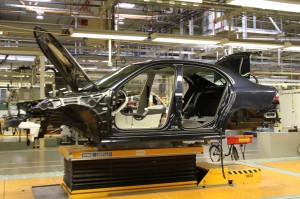Cash-short carmaker Saab has lined up a new white knight, it claims, a week after an earlier deal with China’s Hawtai Automotive Group unexpectedly collapsed.
The new deal pairs Saab with Pang Da Automobile, a major Chinese dealership chain, and could be worth more than $150 million to the Swedish maker, which has been struggling to reopen its headquarters assembly plant. That factory was idled on March 29 when key suppliers began a boycott demanding Saab cover unpaid bills.
As part of the new partnership Pang Da will take a 24% stake in Saab – compared to the 29.9% equity holdings Hawtai had negotiated. Pang Da will pay about $100 million for its stake, then another $45 million for vehicles that will be sold through its network of 1,100 dealerships across China. It has also agreed to another $23 million purchase of Saab products within 30 days.
For the Swedish maker, the deal, “will secure Saab automobile’s medium term funding,” said Spyker Cars, Saab’s parent company, in a statement.
“Both parties are confident that this partnership allows Saab Automobile and Pang Da to create a strong business, initially in the distribution and subsequently in the manufacturing of Saab vehicles in China,” Saab Chairman and Acting CEO Victor Muller said.
Based in Tangshan City, in Hebei Province, about 100 miles east of Beijing, Pang Da was ranked one of the 200 largest enterprises in China last year – and among the top 100 service enterprises. Three weeks ago, the publicly traded company staged the second-largest Chinese IPO of 2011, raising $1 billion in the process.
The company already sells and services a wide assortment of global brands, including Toyota, Mercedes-Benz, Honda and Audi, among others.
“We very much look forward to collaborating with Saab’s management to successfully enter our promising home market,” said the distribution company’s CEO Pang Qinghua.
The deal with Pang Da caps several frantic days of negotiations led by Saab’s Muller – whose Dutch-based Spyker acquired Saab from General Motors in early 2010.
With sales running below expectations, Saab has been cash-short, a situation that came to a head in March when a key supplier refused to deliver parts needed by the carmaker’s Trollhattan, Sweden assembly line. Muller told TheDetroitBureau.com last week that he compounded the situation by confronting the supplier, kicking off a boycott that was quickly joined by dozens of other vendors. (Click Here for that story.)
The Swedish maker thought it had lined up a new source of cash, turning to one-time Spyker investor Vladimit Antonov, a Russian banker who offered to do a lease-back deal in which he would purchase the Trollhattan plant and other Saab assets. But that deal has not been approved by the European Investment Bank, which funded the original purchase from General Motors.
Muller then turned to China, a market he sees as critical to Saab’s long-term survival. Negotiating with several possible partners simultaneously, he inked a deal with Hawtai, earlier this month, that would have given the Chinese automaker a 29.9% stake in return for 120 million Euros – and an additional 30 million Euro loan.
But last week, that deal fell apart. (Click Here for that story.) There have been conflicting explanations for what happened. Some reports indicate Hawtai could not get approval from the Chinese government – a problem that sank a proposed sale of GM’s now-closed Hummer brand to a small Chinese carmaker. Both a Saab source tells TheDetroitBureau.com that after the company completed its equity sale Hawtai began demanding unacceptable changes to the agreement.
“It’s not uncommon that the real negotiations often begin after the contract is signed for the Chinese,” said an industry source – asking not to be identified by name – who has spent several decades dealing with the Asian nation.
There have also been conflicting stories regarding who Muller actually was talking to as an alternative to Hawtai. The Chinese maker Great Wall was one of several possible partners who denied reports they were talking to the Swedes over the weekend.
Plans to reopen the Trollhattan plant this week appear to be on hold, though it’s clear Saab wants to move as quickly as possible. It has been losing production of more than 1,000 of its 9-5 and 9-3 models a week. Muller has said he believes that lost production could be made up in several months, however.
Production of the maker’s new 9-4X, its first crossover vehicle, has continued at a GM plant in Mexico, but industry analysts warn that the dire headlines are likely hurting Saab sales, many potential buyers steering clear of a brand they aren’t sure will be around for long.
Muller has acknowledged that overcoming such concerns will be one of Saab’s biggest challenges once it can get back to business as usual.
Longer-term, the new deal with Pang Da appears to include plans that would allow Saab to produce cars in China, as well, a critical step considering that market’s hefty tariffs on imported vehicles. When the Hawtai deal was inked, Muller also suggested Saab might come up with products specifically aimed at the Chinese market, including a large SUV. The Swedish maker has also been considering other possible new products, including a small car that would be dubbed the 9-2.

